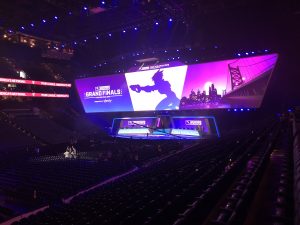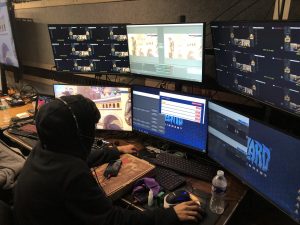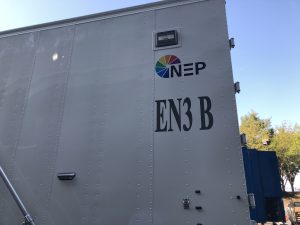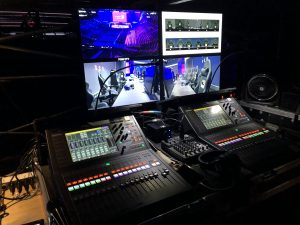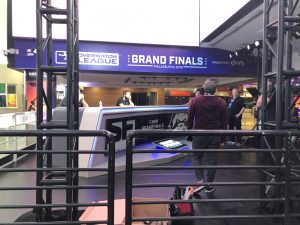Live From the Overwatch League Grand Finals: Wells Fargo Center Welcomes Blizzard Entertainment for Sophomore Season’s Final Clash
The ultimate broadcast includes 27 cameras, onsite programming, and a custom observer room
Story Highlights
It’s been an unprecedented week full of esports-related events in Philadelphia. This past Wednesday, the 2018 Overwatch League runner-up Philadelphia Fusion broke ground on their new arena that will be ready to open in 2021. Today, the two best teams of this year’s season, the San Francisco Shock and the Vancouver Titans, as well as every fan in the esports universe will come in droves to the Wells Fargo Center for the 2019 Overwatch League Grand Finals.
“The relationship with Barclays Center was great, but this venue is owned by one of our teams,” says Pete Emminger, VP, global broadcast, Blizzard Entertainment. “Since Comcast Spectacor owns the Fusion and this building, they have become one of our constant partners. They’ve been super helpful, and we’ve had a really good collaboration. The [Wells Fargo Center team] have been going through a pretty recent renovation and they’ve kept in the loop on the progress and all of their plans.”
Spectator Sport: Compound Hosts a Makeshift Observer Room
For video game aficionados, there’s nothing worse than getting eliminated from a match and having to watch your buddies duke it out for the victory in spectator mode. In an esports production, this player purgatory is the heartbeat of a successful telecast. Outside the Wells Fargo Center, two NEP mobile production trucks (EN3’s A and B units) are handling all of the typical bells and whistles of a traditional sporting event, but inside NEP’s BT-1 auxiliary unit is where the true magic happens. In a blur of adrenaline and excitement, multiple technicians are controlling the observer room that handles all of the in-game coverage.
“The observer room’s system and the game system are connected to the same network,” says Emminger. “Since we’re IT-dependent, everything is fully integrated into that department. We also leverage a global network operations center at home [in Irvine, CA] where they manage this entire infrastructure with sensors in the computers.”
In addition to their responsibility of publishing the in-game footage, the observer room is controlling the personalized viewing for Overwatch League All-Access Pass subscribers on Twitch.
In the other NEP EN3 units, the A unit will be the home of the main production crew. Other production duties, such as EVS servers (with 30 channels of replay) and transmission services will be in the B unit.
All of the Lights: Massive LED Video Wall Puts the Cherry on Top
Seventy-five lbs. of confetti, 175 chain hoists, 2,739 ft. of truss, and 165,206 lbs. worth of show rigging are accented by a sparkling jewel that will make it virtually impossible to not see all of the details occurring during the match for those in attendance. Spanning across the entire length of the main platform and using more than five miles of fiber, a 171 ft. wide LED “Hero” screen (that is three ft. wider than the White House) will add another wrinkle to the production. Blizzard partnered with Creative Technology Group, a live events sector of NEP, on this project.
“We have a custom graphics system that we’ve been continuing to further develop that’s built off of Touch Designer,” says Emminger. “We’re able to trigger all of the screen graphics that are 12x 4K resolution.”
On the other hand, a new toy in the Wells Fargo Center in the form of the recently constructed 4K kinetic video board, will not make an appearance at this year’s championship to avoid issues with players’ line of sight.
Since the uniqueness of the Overwatch League (and esports, in general) mixes the broadcast, live stream, and in-venue show, Vizrt Viz Trio systems are powering the graphics package. Three will be on the premises for the standard show, while four will be offsite to implement overlays that cater to regional areas.
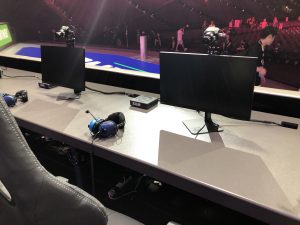
Each gaming station includes the player’s own keyboard and mouse and a POV camera above the monitor.
Around the World in Seconds: Transmission Reaches 32 Destinations
With the league’s 20 teams coming from six countries on three separate continents, the viewership for the Grand Finals will be on a global scale. With 29 original feeds (plus three backup channels), a total of 32 transmission paths will move the various signals to and from the TV compound via IP distribution through the cloud with AWS.
On Twitch, the matches will host channels in five languages: English (overwatchleague), Korean (overwatchleague_kr), Russian (overwatchleague_ru), French (overwatchleague_fr), and Portuguese (overwatchleague_br).
For the live stream on the ESPN App and the broadcast on ABC, there will be dual paths with the help of LTN Global Communications and Zixi to ESPN, which will then be routed to both endpoints.
For the abundant amount of content being generated during the two- to three-hour extravaganza, Emminger and company have concocted an intricate system for on-demand, sponsorship, and social media purposes.
“We have a pretty heavy MAM architecture, so we’re all object-based storage in a data center. We have a team [back at headquarters] doing a few things, such as content in postproduction and localizing a lot of our global sponsorship deals into multiple languages,” he says. “Our team has access to the live feed off of a 10-GB connection for a mini asset management system onsite, so they can conduct live replay clippings and support social media and marketing.”
Hitting the Angles: POVs, Jib Lead Camera Complement
Much like the first-person shooter that the pair of teams are playing, those who tune into the live stream or linear broadcast will be treated to firsthand looks from the gaming chair. Out of the complete arsenal that includes 27 cameras, there will be POVs atop each of the participants’ computer monitor.
“We have 12 of those on stage,” says Emminger. “We like the Blackmagic Design Micro Cinema Camera because you’re able to change the lenses on them. Fixed-lens cameras just don’t seem to work as well.”
An additional POV will provide views of player introductions from a vantage point in the tunnel.
Even though this competition doesn’t necessarily mirror the athletic composition of “stick and ball” sports, the equipment used to present the action is the same. Four robotic cameras will be placed in a couple of different areas, such as the broadcasting booth, two on the playing platform, and one for a wide shot. For sweeping views of the crowd and the playing stations, Blizzard has installed a jib camera at the front of the stage. Other hard cameras on hand will include three handhelds, another handheld of the RF variety, a Steadicam with RF capabilities, three regular analyst cameras, and a long-throw camera with a 95x lens.
With pre-, halftime, and post-match shows as a recurring operation this season, an elevated desk will be seen on the concourse near the front entrance of the arena.
Kickin’ It Backstage: Audio, IT Services Reside Behind the Gaming Platform
In any Overwatch League match, sound needs to be on point at all times. The audio engineer behind the board will be pretty busy, with 208 audio inputs (with player audio coming from the microphone on their headsets) to take care of.
“We run our audio in two separate console systems, one for San Francisco and one for Vancouver, and the teams have to hear each other as well as be able to hear the game at the right volume,” says Emminger. “We also have access to all of this live audio, so we record all of the tracks since we need to give them back to the teams during the week for practice and sometimes for our content series, Comms Check”
Next season, the audio team is looking to make enhancements to their capture system.
“We have custom converters for the player headsets to get back into the normal audio frequencies,” he says. “Next year, we’re looking to roll out more of an IP-based solution to further convert this over to a next-generation system.”
While the players are permitted to accessorize their work station with the mouse and keyboard that they’re comfortable with, the rest of the necessary equipment (sans the inclusion of the monitor) will also be housed in the backstage area. Not only does this strategy reduce the clutter in the playing area, but it also keeps the gameplay and overall production flow with the least amount of stoppages as possible.
“The reason we keep the systems [backstage] is because of faster turnover on a multigame show,” continues Emminger. “The nice thing about this setup is that you can monitor all of the player PCs, so let’s say they have an issue with their mouse or computer, we can fix it from right here.”
Fourteen hours were spent, and 3,000 lines of automation scripting were created for testing to make sure that the PCs were running effectively.
In the backroom, 64 Riedel Communications wireless packs will have all employees running on the same page.
Esports With a Cheesesteak: Teams Get Comfortable in Wells Fargo Center
A year ago, the first-ever finals took place in Brooklyn, NY, at the Barclays Center. With a quick trip down I-95, the Blizzard team quickly set up shop in the Sports Complex in South Philadelphia. Emminger and his staff made three separate survey trips down to the venue to make sure that the location was a perfect fit, and then eventually to check out what technological deployments could be made within the space.
A new city allows more than just new production concepts. Both the vehicular and human traffic of New York City made this difficult to do last year, but with the addition of an expansive parking lot as breathing room, an Outdoor Fan Fest will feature a live DJ, photo opportunities, face painting, giveaways, and kiosks with merchandise, food, and beverages. Also, their first go-round in NYC presented the chance to reflect on lessons learned for this year’s efforts.
“Last year, we learned that we can leverage more of our resources back in Irvine,” says Emminger. “We’ve gotten better at operating in a multi-location network.”
What’s Ahead: BlizzCon 2019, Home-and-Away Model, and More
When most leagues take a hiatus after the champion lifts the trophy over their head, the Overwatch League will stiff-arm a period of relaxation and head toward two other events on the calendar: The Gauntlet presented by the Overwatch Contender Series (Oct. 9-13) in South Korea and BlizzCon (Nov. 1-3) in California.
And with the expected momentum to come from the second Grand Finals, Emminger, the other 200 onsite staffers, and the crew back home are gearing up for a third season that will come with seismic changes, thanks to a home-and-away schedule format.
“This year, we used the three homestands to test and model out a lot of the stuff that we will use next year, and we learned a lot of different things from each one. In some places, we as a league learned things and in others, the teams learned things,” he concludes. “We’ve asked ourselves, ‘How do you engage your fanbase for a six- to seven-hour day?’ and on the broadcast side, we’re learning about what the important things are to focus on.”
